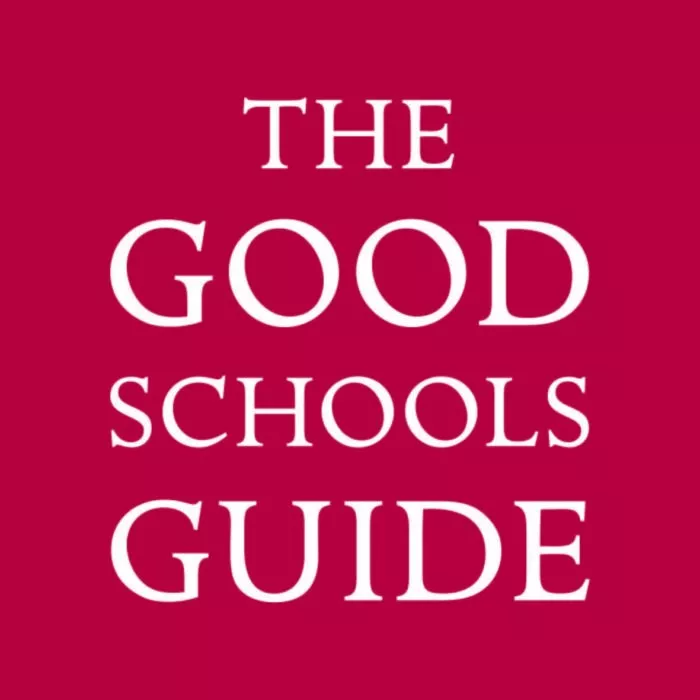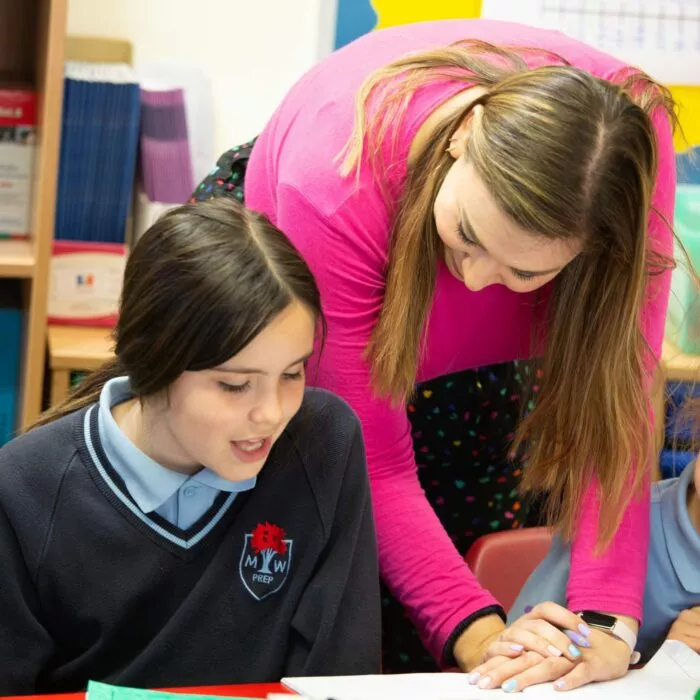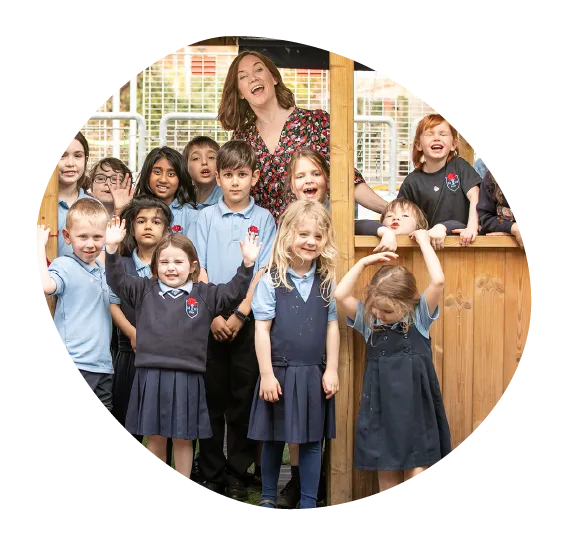
Neither teachers nor children shy away from facts so, refreshingly, good old-fashioned globes, maps and timelines are to be found in every classroom. Historical references come alive when studying music genre Ska, especially in the context of the Caribbean community in Harlesden. Boys and girls practised Coronation dance routines with lots of ceremonial bowing, doffing of hats and general fanfare while the wellbeing dog…..
Head:
Since January 2022, Claire Murdoch BSc PGCE. Prior to this, three years at sister school Faraday in East London (the heads work closely together), and nine years at St Christopher’s, Hampstead, latterly as deputy head.
With a Psychology degree from Leeds, Mrs Murdoch has a particular interest in child wellbeing and development. Feisty and firm but personable and trendy (the shiny black brogues say it all), parents say she ‘embraces suggestions and change’, has a ‘can-do attitude’ and ‘clear vision’, including an aim to increase pupil numbers while maintaining small and manageable class size. Communication is strong; parents know what’s coming, both in the term ahead (topics, trips, assemblies, concerts) and on a day-to-day basis: ‘her door is always open’, in this case quite literally propped open with Maple Mouse door stops finely dressed in knitted garments. Mrs Murdoch embodies the community feel by knowing all parents and children by name, and makes staff feel equally valued : ‘I try to help excited new teachers’ she says. Teachers feed off Mrs Murdoch’s enthusiasm and confidence, telling us that the ‘value of the week’ – optimism/positivity – is as relevant for staff as for the children. The Nepalese singing bowl in her office resonates with soothing tones and its spiritual but purposeful energy is felt throughout the school.
Places offered on a first come, first served basis from ‘committed’ families; sibling priority. Non-selective academically from the age of 4 for two-form entry. Up to 18 in each class. Occasional places higher up the school, offered in order of registration and after spending half a day at the school to assess the basics.
Almost as many destination schools as there are pupils in the year. Offers from 24 schools, including 3 academic scholarships and offers from state schools, in 2023. School and parents ultimately prioritising fit and wellbeing. City, Maida Vale, Francis Holland, South Hampstead, Northbridge House and all-time favourite Belmont (Mill Hill) in the mix.
Maple Walk is one of two New Model Schools which operate on a not-for-profit basis and share certain overhead costs such as admin, inset days and some specialist teachers. The school follows parts of the national curriculum, but also emphasises a broad, creative, knowledge-based curriculum, neatly summarised by the head as ‘building up knowledge: recalling, retaining and putting it into context’. Neither teachers nor children shy away from facts so, refreshingly, good old-fashioned globes, maps and time-lines are to be found in every classroom. Quizzes support learning (and the all-important house point tally) and ‘help prove the value of a deep well of knowledge’. History lessons, for example, are taught in chronological order, from dinosaurs to World War II. This in itself doesn’t sound too radical, but the consolidation of facts through interactive and practical tasks, and making connections with what comes before, is key. Children speak enthusiastically of ‘Back in Time’ day, when each class dresses up according to the period they are learning about, causing them to think about context and historical progression, as they themselves progress through the school.
Context is also reinforced with an emphasis on cross-curricular. Historical references come alive, for example, when studying the music genre Ska, precursor to reggae, especially in the context of the Caribbean community in Harlesden. French learning is also reinforced through music. We watched as children gave an energetic rendition of ‘Quelle est la date de ton anniversaire?’ accompanied by an equally spirited music teacher on the ukelele. Teachers clearly collaborate to explore connections between subjects and make every topic come alive. One teacher said ‘everyone cares, we work as a team, like one big family.’
Outside space is used wherever possible for practical application; on the day of our visit ordinal numbers were reinforced by making a long number line, adding missing numbers, along the path outside the classroom. Younger children learnt about capacity while cooking up a storm with water and sand trays in the garden. Mixed academic needs are met by differentiation and an awareness of different ways of learning. We saw visual and audible cues used to excellent effect in storytelling. There is no setting as such, but we did hear of discreet tiers of spelling and maths homework. Small classes can be flexible; TAs support individuals or small groups in the classroom while others benefit from extension work. Parents told us of ‘extend and push, to good effect’ before 11+ exams, and of valuable interview practice with New Model School board members. Parents are impressed by dedicated teachers going ‘above and beyond’ to give booster sessions to children before or after school.
A creative vibe is felt as soon as you step through the school gate; shiny metal installations and kinetic artworks created by the children shimmer in the sunlight. The charming Maple Mouse doll’s house, small home-made rodents in residence, is just inside the entrance. We soon realise that Maple Mice are mascots and friends, who even go on school trips with their own tiny home-made suitcases. ‘Creativity’, as one parent said ‘is entrenched’. ‘Art and drama are so well thought through’ enthuses a parent, all too aware of the limitations of space and resources. Artwork based on Rousseau’s Surprised! as part of the National Gallery Take One Picture Project forms the basis of cross-curricular work in the classroom, ranging from tropical storms to discussing the tiger’s feelings. Parents say drama productions are ‘first class collaborations between drama and music’, both equally valued, with children participating unselfconsciously. On the day of our visit boys and girls practised Coronation dance routines with lots of ceremonial bowing, doffing of hats and general fanfare while the wellbeing dog watched on. An after-school jam club allows older children to let off steam and gives gifted singers the chance to extend their repertoire with the ‘brilliant’ music teacher, whose ukelele is never far away. Tongue twisters meet Rock and Roll in the outside pods where pupils may take extra LAMDA or music lessons. Teachers reveal secret talents when it comes to clubs: Japanese, robotics, cookery, taekwondo, coding; they are a versatile bunch and parents are particularly appreciative.
Pastoral care is to the fore and emotional issues tend to be picked up early. After breaktime, children chart their feelings on a colour-coded ‘zone of regulation’ board – red if angry, green if ready for learning – alerting teachers to any problem. The wellbeing zone is a calm space with mesmeric lava lamps, colouring books, a teacher to talk to, and two guinea pigs, whose own wellbeing is managed by different families in the holidays. The head invites children to weekly breakfasts here (the Big Breakfast brainstorming session suggesting a de-stressing lego club for teachers and a bonsai appreciation society). There is a sense of children knowing themselves and accepting each other for who they are, with ‘no pressure to conform’. It was heart-warming to see children speak up in class with an opinion, and to feel heard. ‘A growth mindset’, not unusual jargon for teachers, is everyday vocabulary for children: a classroom display encourages them to think about personal setbacks and challenges in order to raise their own expectations. Mistakes are acknowledged and valued.
Sustainability credentials rang loud and clear long before they became fashionable. The school, holder of Eco Schools Green Flag award, is a pioneering eco-friendly build, with solar panels, ground source heat pump and sedum roof to attract wildlife. Reducing food waste (house points for finishing everything on your plate), planting wildflowers and composting are just a few initiatives introduced by young eco ambassadors to nurture respect for the environment. The school also holds a TfL gold star award for sustainable travel: the ‘walking bus’ meets children every morning in Roundwood Park to reduce traffic pollution outside school. The park is also used increasingly for practical outdoor learning. Mrs Murdoch says ‘there is not a subject that you cannot take outside – mapping, music, creative writing, design technology – all of it can be explored and developed in the great outdoors at the end of the road’. Forest school is available from reception to year 4.
Sport takes place in the park where possible – running, football, cricket, basketball, netball, PE – with gymnastics, dance and sports skills on site. Even a compact space in the back playground boasts a climbing wall. ‘It’s very inclusive’, says a keen young sportsman, ‘there are loads of fixtures and everyone gets their chance to have a go.’ Tournaments against other schools in Brent, not just independent schools, are popular. Four ping pong tables see a lot of action at break. ‘Everyone has found their sport’ one wise year 6 pupil tells us; ‘the girls do everything the boys do. We all join in’.
The sense of all being in it together extends to the parents too. The head mentioned how ‘the community aspect is really strong’. We heard repeatedly of the ‘supportive’ and ‘dynamic’ parent body who tend to live locally (NW10, NW2 in the main) and choose the school for its ‘family vibe’ and ‘intimate village feel’. They want their children to grow ‘organically, at their own pace’, and to feel comfortable in their own skin, and in their school uniform – very relaxed, practical polo shirt and shorts rather than posh blazer and tie. ‘It’s not drop and go’, says the head. Parents are ‘involved and invested’. They are invited to assemblies to watch, or to talk about their career or their family background. Fund-raising tends to be based around improving specifics, such as lighting or outdoor planting. With just over half the pupils coming from ethnically mixed families, an international evening to celebrate cultural and religious difference sees an impressive range of dishes, from salt beef to samosas. There is a growing sense of wider community too; children are made aware of the impact they can make as socially responsible citizens: singing at local care homes, collecting for food banks, litter-picking in the park, charitable outreach. Even as a more ‘affordable’ independent school, there is an awareness among parents of being in a comfortable bubble in a socially and economically mixed part of London; this social conscience extends to the children too.
Not-for-profit, fees ‘at the lower end of the spectrum’, with the aim of making an excellent education available to more children. ‘Modest surpluses’ are ploughed back in. Patrons and supporters are sympathetic to financial difficulty. Bursary funds may be available to existing pupils.
Small, unflashy, relaxed and nurturing. ‘Children can be happy kids who don’t grow up too quickly, but they are also citizens who know they can make a positive difference in the world’ says one dad. ‘It’s not an incubator with the dial turned up.’ There is a sense of appreciation from pupils and parents who feel fortunate to belong to this community. A breath of fresh air in the North London hot house.


Admissions
Visit Us
The best way to see the school in action is to book onto an open morning. These events last approximately an hour – you will have an opportunity to meet the Head and have a tour of the school led by the Year Six pupils. We look forward to welcoming you to Maple Walk soon.
